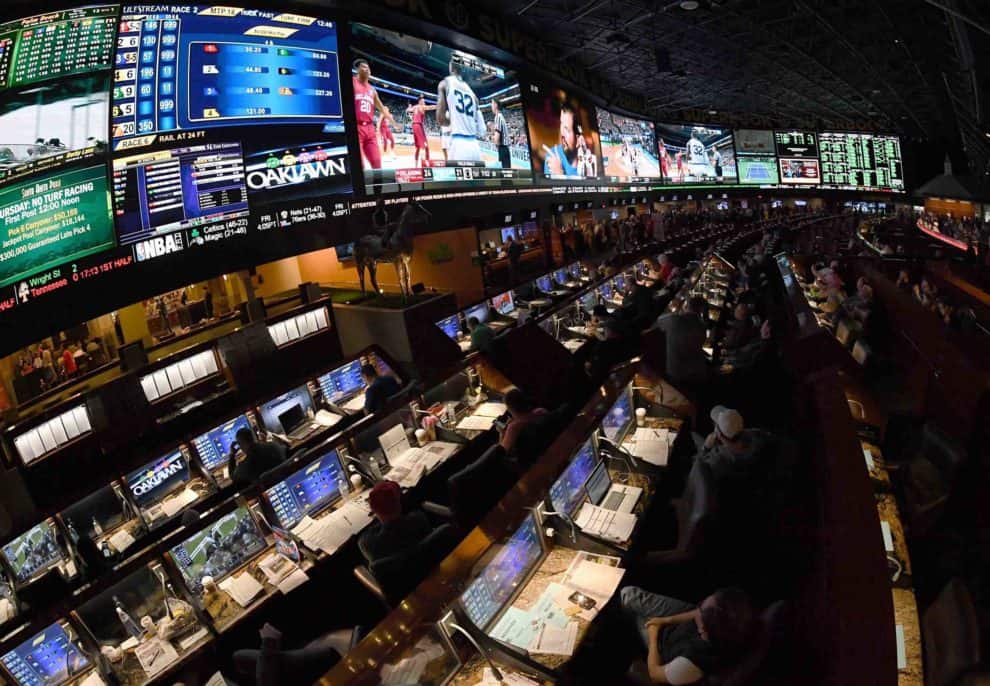
There’s a great quote from KISS bassist Gene Simmons who explained why he and his bandmates announced a reunion in the late 1990s wearing their iconic makeup for the first time in 15+ years:
“There’s a truck load of money driving through town. You either get on the truck or you watch the truck go by.”
With the National Football League’s efforts to stop the spread of legal sports having failed long ago and their scheme to get a cut via ‘integrity fees’ and similar nonsense going about as well as Wile E. Coyote’s crusade to rid the Sonoran Desert of purple roadrunners the league has very quietly shifted gears. After doing everything they could to deny US citizens the right to bet on sports–often using political connection and taxpayer dollars to achieve their nefarious goals–the National Football League has thrown in the towel more emphatically than Mark Breland did on behalf of Deontay Wilder in his fight against Tyson Fury this past weekend.
The story was buried on page A2 of the Weekend Wall Street Journal (paywall):
The National Football League took another step toward fully
embracing legalized sports gambling by allowing teams to ac-
cept sponsorships from sportsbooks.
Deals with places that allow sports betting could provide a
new revenue stream for teams.More than half of NFL teams
will by next year be located in or near jurisdictions that have legalized betting.
For decades, the NFL pushed back against the expansion of
sports betting out of fears that it could challenge the game’s integ-
rity. In recent years, the NFL has done an about-face as it ceased
to see the expansion of sports betting as a threat and increas-
ingly saw it as an opportunity to engage younger audiences and
connect with people who follow sports on their phones.
That change of heart came as the U.S. Supreme Court is-
sued a ruling in 2018 that allowed states beyond Nevada to
legalize sports betting.
A lot to unpack here but suffice to say that the NFL’s version of the narrative is about as accurate and objective as Vince McMahon’s account of the history of pro wrestling. The account from the WSJ suggests that this is a proactive move from the league which now realizes that a new generation of fans have already embraced sports betting. That’s not exactly how it went down. The NFL simply lost in their efforts to deny sports betting to US citizens. The ‘change of heart’ definitely didn’t come with the ruling that struck down PASPA–the NFL immediately started throwing their political/legal muscle behind a scheme to regulate it at the Federal level proposed by bottom feeders Orrin Hatch and Chuck Grassley that would have amounted to a de facto prohibition. When *that* didn’t work they started trying to mandate ‘integrity fees’ and requirements that sportsbooks in newly legal jurisdictions use official league data. None of this worked.
Meanwhile, the league’s member franchises forced their hand. Several teams quickly signed deals with nearby casinos to promote their online offerings. Technically, they couldn’t promote the sports betting component until now but they could do things like the Philadelphia Eagles did when they named Unibet as an ‘official casino partner’. Unibet offers online casino betting in Pennsylvania as well as online sports betting. The Eagles couldn’t promote the Unibet sportsbook but they could hawk the company’s online casino portal–where the visitor would find plenty of guidance on how to access the sports betting platform. The New York Jets did something similar, extending a sponsorship deal with 888.com. Like the Eagles deal, it is nominally for the Jets to promote the ‘online casino platform’ but at the same time they’re creating brand awareness for 888’s sports betting offerings.
Although the NFL allowing sportsbook sponsorships is a big step it’s not the first step by the league to monetize the new era of legal betting in the US. Before last season, they expanded a gaming data deal with Sportsradar. In September, they signed DraftKings as the ‘official fantasy sports partner’ of the NFL. At the time they made clear that the deal was only for ‘fantasy sports’ and not sports betting but by that point the writing was on the wall. It didn’t get any serious media coverage here, but the NFL also quietly started licensing their trademarks and other intellectual property for use on sportsbooks in Europe and Australia.
On a practical level, the NFL’s acquiescence to the new wave of sports betting freedom in the United States doesn’t mean much. The spread of sports betting will happen with our without the NFL so it is a good move for them to get their ‘fingers in the pie’ where they can. It’s significance is on the symbolic level–with the NFL signaling their acceptance of the new reality along with staid broadcast entities like CBS (which announced a deal with William Hill last week) there is no doubt that the mainstreaming of sports betting in the US is well underway.









